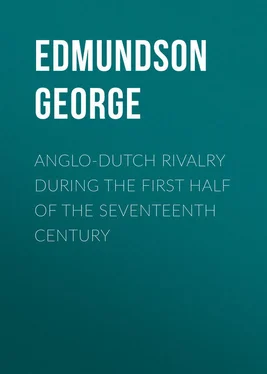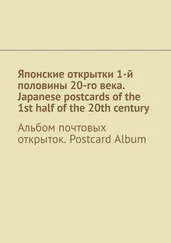George Edmundson - Anglo-Dutch Rivalry during the First Half of the Seventeenth Century
Здесь есть возможность читать онлайн «George Edmundson - Anglo-Dutch Rivalry during the First Half of the Seventeenth Century» — ознакомительный отрывок электронной книги совершенно бесплатно, а после прочтения отрывка купить полную версию. В некоторых случаях можно слушать аудио, скачать через торрент в формате fb2 и присутствует краткое содержание. Жанр: foreign_antique, foreign_prose, на английском языке. Описание произведения, (предисловие) а так же отзывы посетителей доступны на портале библиотеки ЛибКат.
- Название:Anglo-Dutch Rivalry during the First Half of the Seventeenth Century
- Автор:
- Жанр:
- Год:неизвестен
- ISBN:нет данных
- Рейтинг книги:4 / 5. Голосов: 1
-
Избранное:Добавить в избранное
- Отзывы:
-
Ваша оценка:
- 80
- 1
- 2
- 3
- 4
- 5
Anglo-Dutch Rivalry during the First Half of the Seventeenth Century: краткое содержание, описание и аннотация
Предлагаем к чтению аннотацию, описание, краткое содержание или предисловие (зависит от того, что написал сам автор книги «Anglo-Dutch Rivalry during the First Half of the Seventeenth Century»). Если вы не нашли необходимую информацию о книге — напишите в комментариях, мы постараемся отыскать её.
Anglo-Dutch Rivalry during the First Half of the Seventeenth Century — читать онлайн ознакомительный отрывок
Ниже представлен текст книги, разбитый по страницам. Система сохранения места последней прочитанной страницы, позволяет с удобством читать онлайн бесплатно книгу «Anglo-Dutch Rivalry during the First Half of the Seventeenth Century», без необходимости каждый раз заново искать на чём Вы остановились. Поставьте закладку, и сможете в любой момент перейти на страницу, на которой закончили чтение.
Интервал:
Закладка:
Delayed by various causes, it was not till April 16, 1610, that the embassy from the States set sail from Brill for England. The object of the mission was ostensibly a complimentary one – to thank the King for the active part he had taken, as a mediator, in bringing the truce negotiations to a favourable issue. The two matters which called for serious discussion were: (1) the critical situation which had arisen in the Jülich-Cleves Duchies owing to a disputed succession; (2) the proclamation about the fisheries. The importance of the last question was revealed by the fact that all the five envoys originally selected were representatives of the two maritime provinces. One of the five died at Brill just before starting. The four who actually sailed (April 16) were: Johan Berck, pensionary of Dort; Albert de Veer, pensionary of Amsterdam; Elias van Oldenbarneveldt, pensionary of Rotterdam; and a Zeelander, Albert Joachimi, who was later to show himself a skilful diplomatist during the twenty-five years that he was resident Dutch ambassador in London. Elias van Oldenbarneveldt was the brother of the Advocate of Holland. According to a letter from Sir Ralph Winwood 14 14 Winwood's Memorials , March 16, (o.s.), 1610. See also letter of April 6 (o.s.).
to Lord Salisbury he had special charge of the fishery question, a proof of the peculiar interest felt by the Advocate in the issue raised. With them was joined the resident ambassador, Noel Caron. Their instructions required them to seek from His Majesty an explanation of his intentions in the proclamation, 'since their High Mightinesses the States-General could not believe that he meant to include the inhabitants of the United Netherlands among those who were bidden to pay for a licence to fish, since this was contrary to the ancient treaties subsisting between them and the Crowns of England and Scotland. After audiences with the King (April 27) and with the Privy Council (May 8), it was arranged that a Conference on the fisheries question should be held, with a Committee of the Council, two of whose members were Sir Julius Caesar, Chancellor of the Exchequer, and Sir Thomas Parry, Chancellor of the Duchy of Lancaster. The Conference opened on May 16, and the points in dispute were argued at length. The Dutch case was presented in a memorandum drawn up with much skill, probably by the hand of Hugo Grotius himself. The freedom of fishing was claimed on two grounds: (1) that of the privileges granted by ancient treaties still in force; (2) that of abstract right, because the sea, like the air, is for the common use of all and cannot be private property. The weak point of the case lay in the fact that these two grounds, that of treaty right and that of the Mare Liberum , seemed to be in a certain sense contradictory. The English, however, would not admit that the question of the immemorial claim of the Kings of England to sovereignty and jurisdiction in the seas adjoining the British coasts was open to discussion, and seizing upon the argument placed in their hands by the Dutch memorandum itself, pleaded with great force that the granting of privileges implied the power to take them away or modify them, should the King deem such a step necessary to protect the interests of his own subjects. The Conference therefore effected nothing more than the bringing out in relief of the differences of view of the two parties. But reflection brought wisdom. There was no wish on either side to press matters to extremities. Already on May 10 the States-General, unwilling to run the risk of making James an enemy, at a time when they were very anxious to secure his help in the settlement of the Jülich-Cleves succession question 15 15 See Note C.
, had sent instructions to their ambassadors not to make difficulties or unpleasantness about the fisheries, but rather to propose that the execution of the proclamation should be postponed for two years, in order that the question might be thoroughly investigated. There were several claimants to the Jülich-Cleves inheritance, Protestant and Catholic, and it was of vital importance to the States, and also to a lesser extent to all Protestant princes in Germany and to James, that this frontier territory on the Rhine should not fall under the rule of a Catholic sovereign. But the Archduke Leopold had seized the fortress of Jülich, and Henry IV of France, jealous of the power of the House of Habsburg in Europe, had put himself at the head of a coalition to secure the succession to the Elector of Brandenburg, and William, Count Palatine of Neuburg, as joint possessors. There was a general desire to avoid hostilities, but Henry IV had pushed forward his preparations for a great campaign, and war seemed inevitable. At this moment the assassination of the French king at the very time the Conference was being held in London changed the whole aspect of affairs. The new French Government was favourably disposed to Spain. The Dutch therefore were left face to face with the task of expelling the Archduke from Jülich, and they felt that all other matters were for the moment of secondary importance to that of having the friendly co-operation of James in case of the outbreak of war. Their attitude to the fisheries question was therefore considerably modified. It became much more conciliatory, and for precisely similar reasons a like change took place in the attitude of the English King. He too felt that the friendship of the Dutch was essential to him at such a critical juncture, and at a meeting with the Earls of Salisbury and Northampton, May 24, the Dutch envoys were agreeably surprised to find that the King, while not formally abating one jot of his sovereign rights in the matter of issuing licences for fishing, was willing to postpone the execution of his edict for two years. The ambassadors took leave of the King the same day and started on their return journey. Of this audience the Lords of the Council, in a letter to Winwood, dated May 18, 1610 (o.s.), write:
'For the States Ambassadors, His Majesty is now dismissing them with sufficient assurance of his inward affections towards them and the preservation of their State, which next to his own he holdeth most dear above all other respects in the world. And as for the matter of fishing and Reglement of commerce, His Majesty thinketh not fit now to spend any more time in it, but to refer the one and the other to some better season; and in the meanwhile that things may remain in the same state as now they are. So as we conceive these Deputies will return with good contentment, having no other cause either for the public or for the private; and His Majesty having also been careful to give them the rights that appertain to their title, and all other external courtesy and honour in their reception.'
This good understanding was to bear good fruit. The army, which Maurice of Nassau led into the duchy in June, contained a fine body of English troops under the command of Sir Edward Cecil. Jülich was besieged and surrendered to the Dutch on September 1, and the Archduke Leopold was compelled to leave the territory. Of this achievement Sir Ralph Winwood, writing to Lord Salisbury from Dusseldorf, August 22 (o.s.), says: 'The honor of the conduct of this seige no man will detract from the Count Maurice, who is the Maistre-ouvrier in that Mestier . But that this Seige hath had so happy an end, himself will and doth attribute it to the Diligence and Judgement of Sir Edward Cecil.' The capture of Jülich did not indeed end this thorny little dispute. Anglo-Dutch and Spanish-Imperial armies, under Maurice and Spinola respectively, manœuvred within a short distance of one another. But the quarrel was localized, no further hostilities took place, and finally by the Treaty of Xanten, November 12, 1614, an arrangement was arrived at. During all this time the relations between James and the States were friendly. The King, however, had quarrelled with his Parliament, and even had he wished to take a stronger line in foreign politics, lack of funds compelled him to temporize. The English contingent in Maurice's army was recruited indeed in England, but the troops were in the pay of the States. Moreover, James was all the time hankering after a Spanish marriage for the Prince of Wales, from mixed motives doubtless, but chiefly from a misguided notion that such an alliance between the leading Catholic and the leading Protestant State would enable him to play the part of arbiter in the religious differences which were dividing Europe into two hostile camps, and by his influence to prevent an actual breach of the peace. This was the underlying motive which prompted all the apparent fluctuations of his policy. Hence the persistence with which for so many years he pursued the chimaera of a Spanish match, while at the same time he allowed his only daughter to marry the Elector Palatine, the head of the Protestant Union in Germany, and endeavoured to maintain good relations with the United Provinces, notwithstanding the continual friction between his subjects and the Dutch regarding the increasing monopoly by the latter of the fisheries and of sea-borne trade. The situation in 1611 is thus described by the Venetian, Marcantonio Correr 16 16 Relazioni venete , Inghilterra , serie iv, p. 128.
: —
Интервал:
Закладка:
Похожие книги на «Anglo-Dutch Rivalry during the First Half of the Seventeenth Century»
Представляем Вашему вниманию похожие книги на «Anglo-Dutch Rivalry during the First Half of the Seventeenth Century» списком для выбора. Мы отобрали схожую по названию и смыслу литературу в надежде предоставить читателям больше вариантов отыскать новые, интересные, ещё непрочитанные произведения.
Обсуждение, отзывы о книге «Anglo-Dutch Rivalry during the First Half of the Seventeenth Century» и просто собственные мнения читателей. Оставьте ваши комментарии, напишите, что Вы думаете о произведении, его смысле или главных героях. Укажите что конкретно понравилось, а что нет, и почему Вы так считаете.












